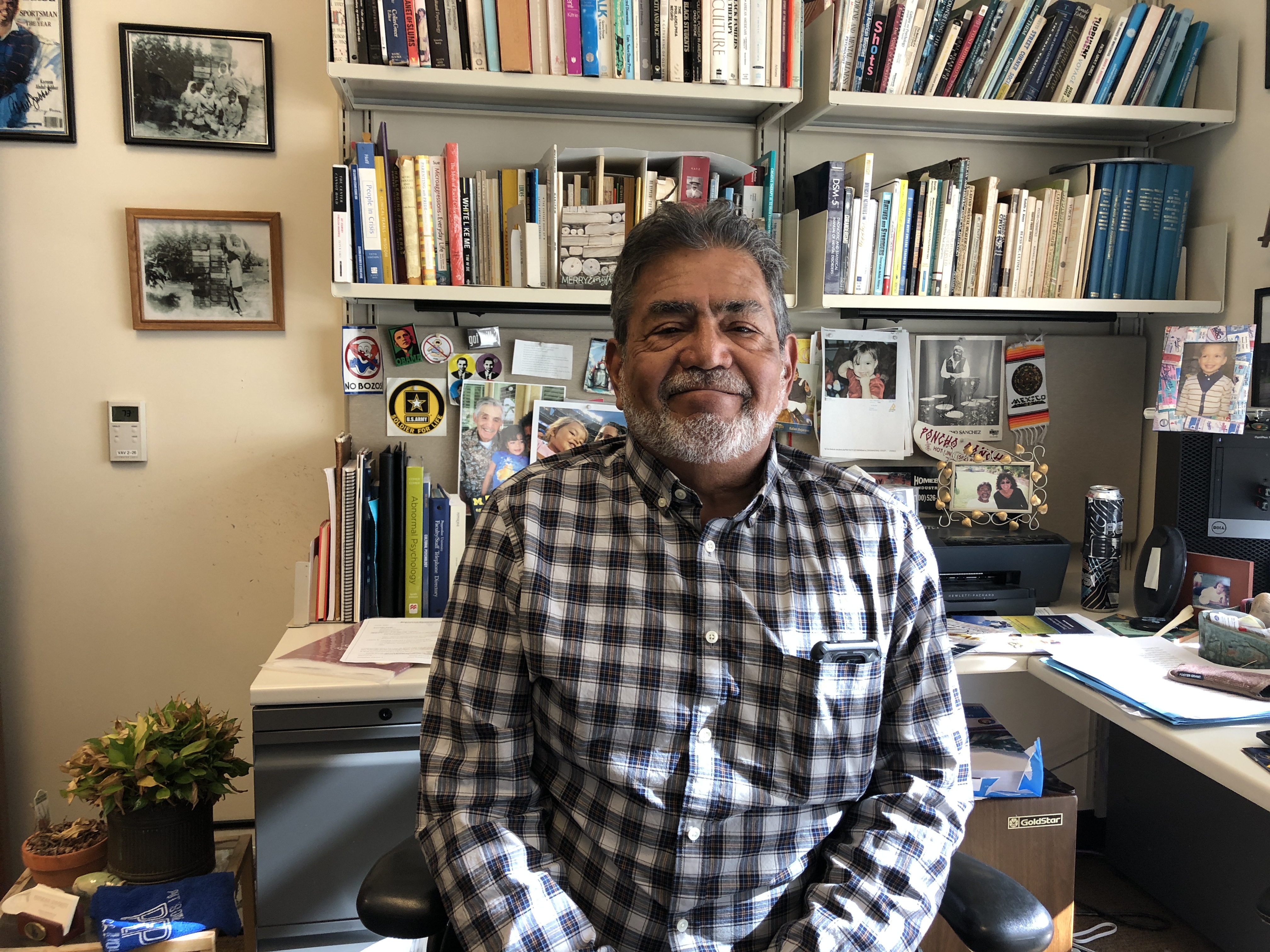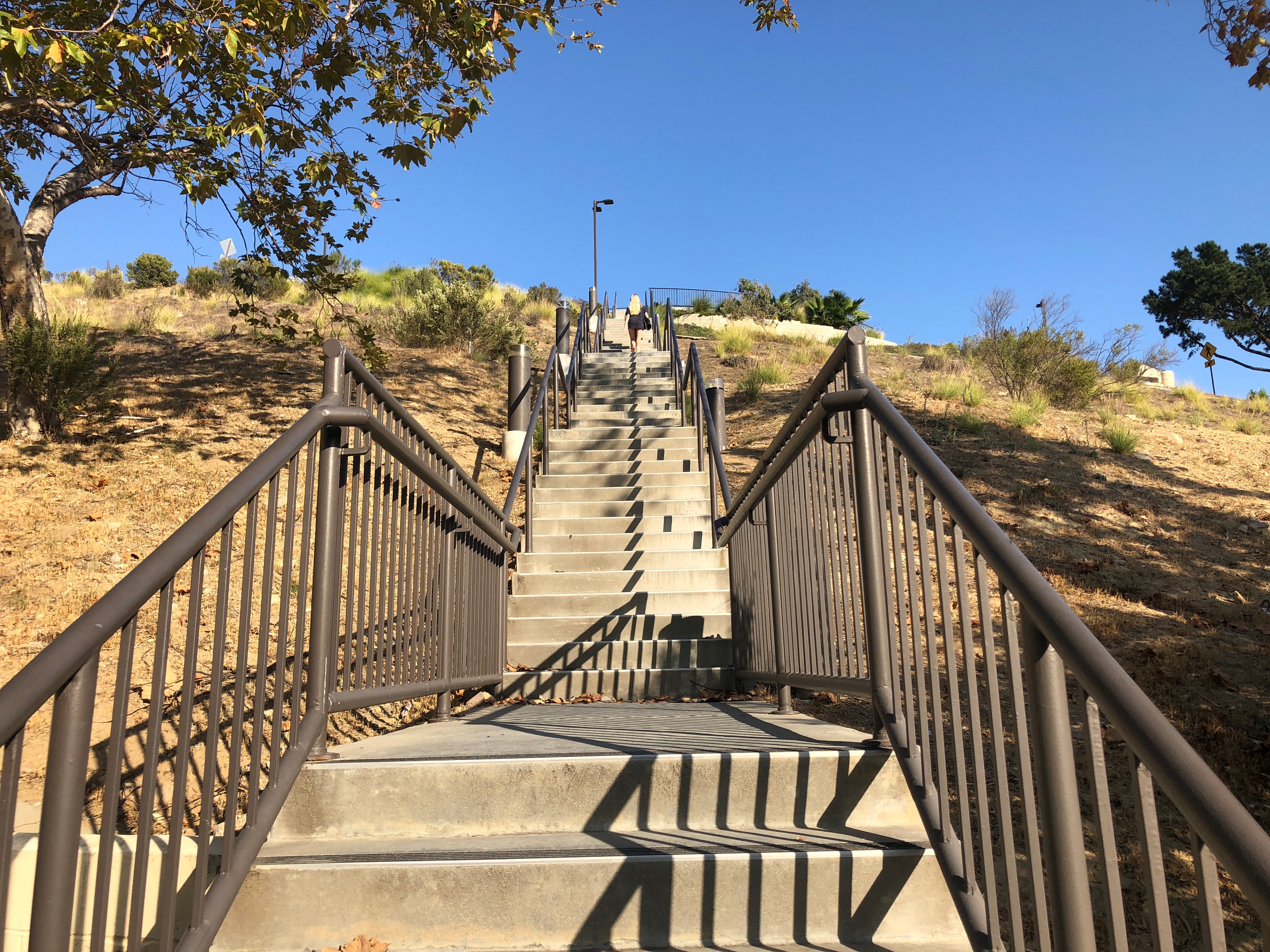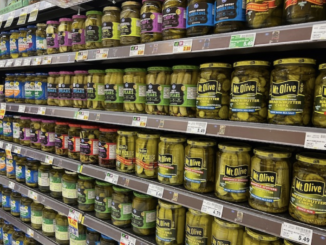
Pepperdine Psychology Professor Tomas Martinez has to think carefully about what events or meetings to attend on campus because of the energy it takes for him to get there.
Martinez contracted polio at 1 years old and has only known a life lived with crutches. More recently, he’s needed a wheelchair due to a neck injury.
“I have to negotiate my life here,” he said, “on where I can go, what energy I have to spend, and is it worth it?”
Outsiders know of Pepperdine’s beautiful views and wild landscape but many forget what the mountainous terrain means for people like Martinez who are physically disabled.
“The handicapped people here are basically an invisible minority,” Martinez said.
Everyday challenges
Limited access points for the library, cafeteria, classrooms and dorms pose real struggles for students, staff and potential students. While Pepperdine currently has few people on campus with wheelchair needs, there are some, and many other short-term mobility issues pop up when injuries arise.
Martinez has faced problems with accessibility his whole life. At this point, he said he has learned ways to deal with places not being fully accessible.
“The restrictions seem to be barriers that I have to deal with like parking, like access to classrooms, like access to the cafeteria, access to chapel, access to the library,” Martinez said. “There still are restrictions of access that I have to live with daily and I have to navigate my world everyday to figure out if I can get to where I need to go.”
The shuttles do not accommodate wheelchairs. A few years ago, DPS created a mobility cart which could be called from anywhere on campus specifically for people who face mobility struggles. This can take a little longer than a regular shuttle bus though because sometimes DPS has different priorities, said Jennifer Baker, assistant director of the Pepperdine Office of Student Accessibility.
“DPS is not reliable,” Sydnie Anderson, pre-med sports med major, said.
Anderson recently underwent surgery on her meniscus and wears a full leg brace and uses crutches. She said she now realizes how much of Pepperdine is stairs.
“Getting from point A to point B is more thought provoking,” she said.
Anderson needs help from friends everywhere she goes. From little things like carrying a granola bar and water to big things like getting to the basement of the Keck Science Center.
A Pepp Post poll of 50 students found that students largely agreed that Pepperdine is not very accessible.
The university has tried to make many alterations to the campus to provide equal access to all.
The new Payson library is decked out with automatic sliding doors and an elevator to the second floor. But even then, Martinez must ask for a key and a librarian to take him up and down the elevator.
“It makes you feel different,” Martinez said. “It makes you feel like you are less than.”
How the campus is changing for the better
People like Baker have overseen improvements in the last last five years. Baker is passionate about making Pepperdine accessible to anyone who wants to be here.
“It’s really more about equality and access that I’m interested in and I love working with people,” she said.
Pepperdine is in compliance with the Americans with Disabilities Act, according to Pepperdine’s website. Administrators do not consider a student’s disability in evaluating admission criteria. Once accepted, the university accommodates any disability if the student makes one known.
Pepperdine receives federal funding for complying with the Rehabilitation Act of 1973 section 504. This act protects people with disabilities from being discriminated against and provides them with the means to succeed, she said.
“We find what we’ll be able to accomodate for that impairment,” Baker said.
The Americans with Disabilities Act protects those who have an impairment affecting a major life function. Baker said sometimes a broken arm doesn’t count under the ADA so the Office of Student Accessability offers their own set of accommodations such as a note-taker, scribe or extra time on tests.
Pepperdine isn’t for everyone
Baker has dedicated much of her career to making spaces accessible but said Pepperdine’s campus has unique challenges given that it is built on the side of a mountain.
“I think that when they [students] get here to campus some may opt out because they say, ‘I don’t want to have to navigate these hills,’” Baker said.
Students choose to not go to certain colleges for all different reasons, Baker said. For example, if a student has allergies they most likely wouldn’t want to go to a school where seasonal allergies are prominent. Similarly, if a student is in a wheelchair they will be more critical of any college campus that they tour.
Baker said her office focuses on making the campus accessible to students and staff on a case-by-case basis, rather than making it accessible with the hopes of drawing in disabled people.
Pepperdine offers students scholarships or financial aid if they can’t pay for school on their own. Similarly, once they’re admitted, Pepperdine offers certain accommodations to students depending on their disability, according to the university’s website.
The new Seaside residence hall shows the school’s positive efforts toward accessibility for all.
Grace Benner, a sophomore public relations major, lives in the new dorm and said she has a handicap room. Her closet is low to the ground and she has wood floors and a huge shower with two shower heads, all to make it accessible for a student who would want to live there.
Student opinions
Pepperdine students agreed that the campus isn’t easily accessible.
“The campus isn’t set up with students living with physical disabilities in mind,” sophomore sociology major Grace Wilson said. “There are barely any ramps or elevators.”
Junior communication major Seneca Fuller said Pepperdine isn’t a place where someone in a wheelchair or with another mobility issue would thrive.
“I wouldn’t recommend it to someone who’s handicapped,” Fuller said.
Others said that although the campus isn’t designed to be accessible, it should be and offered suggestions like adding more ramps.
“If someone wants to be able to get somewhere they should be able to have the means to do that regardless of whether they have legs or whether they’re handicapped,” Rahool Aroon, junior math education major, said.

Accessibility and acceptance
Jeff Banks, Social Action and Justice professor, agreed that Pepperdine should be accessible to all and continue to create new accommodations for students and staff.
“Whatever it takes to allow students who are physically disabled to get from one part of the campus to another and feel reasonably comfortable about it and feel welcomed,” Banks said. “I think that’s a win win but the cost is expensive.”
Banks has been teaching at Pepperdine for 31 years and started the SAAJ program. He advocates for those who live with a disability whether it be permanent or temporary.
“We have a responsibility as human beings to care about others,” Banks said.
Banks’ classes educate students on a wide variety of social justice issues including a unit on disabilities. Banks invites Martinez in every year to speak to students.
“When Jesus said, ‘Whatever you’ve done for the least of these, you’ve done for me,’ so I think that we should be doing the most that we can,” Alley Blanchard, sophomore sports medicine major, said.
Pepperdine’s students and staff care about their peers and co-workers who are disabled. Banks said his wish is for integration to occur between those who are handicapped and those who aren’t.
“To learn, students need to know about those that have a hard time in life, those that are suffering, those that are marginalized, whether it’s in terms of race, gender, sexual orientation or disability,” Banks said.
Both Banks and Martinez advocate for those who are handicapped not only on Pepperdine’s campus but beyond.
“Capability as opposed to disability is something I’ve always argued,” Martinez said.
Ivy Moore completed the reporting for this story under the supervision of Dr. Christina Littlefield and Dr. Theresa de los Santos in Jour 241 in fall 2018. Dr. Littlefield supervised the web story.



